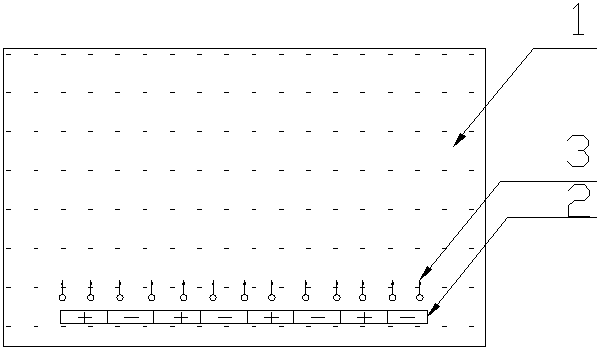Device for producing hydrogen fuel by decomposing water through solar energy
A technology for decomposing water and hydrogen fuel, which is applied in the electrolysis process, energy input, electrolysis components, etc., can solve the problems of long time, reduced hydrogen and oxygen production, and inability to store and transport, so as to increase gas production and shorten Effects of physical distance, reducing physical distance and time
- Summary
- Abstract
- Description
- Claims
- Application Information
AI Technical Summary
Problems solved by technology
Method used
Image
Examples
Embodiment Construction
[0007] The present invention will be further described below in conjunction with the accompanying drawings.
[0008] The photovoltaic cell 2 is directly put into the electrolytic aqueous solution 1 of the traditional electrolytic hydrogen production device, and the two ends of the photovoltaic cell 2 will generate positive and negative voltages under the irradiation of light. The positive and negative voltages generated by the photovoltaic cell 2 in the electrolyzed aqueous solution will cause the aqueous solution to generate hydrogen and oxygen 3 . The traditional electrolytic hydrogen production device uses a catalyst (such as titanium oxide) to absorb light energy and provide electrons under the irradiation of light, so that hydrogen ions become hydrogen atoms, and at the same time take away the electrons of its hydroxide ions, so that hydroxide ions become hydrogen atoms. into oxygen atoms. Although hydrogen and oxygen are produced, due to the very close distance between ...
PUM
 Login to View More
Login to View More Abstract
Description
Claims
Application Information
 Login to View More
Login to View More - R&D
- Intellectual Property
- Life Sciences
- Materials
- Tech Scout
- Unparalleled Data Quality
- Higher Quality Content
- 60% Fewer Hallucinations
Browse by: Latest US Patents, China's latest patents, Technical Efficacy Thesaurus, Application Domain, Technology Topic, Popular Technical Reports.
© 2025 PatSnap. All rights reserved.Legal|Privacy policy|Modern Slavery Act Transparency Statement|Sitemap|About US| Contact US: help@patsnap.com

